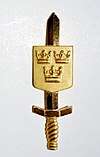Defence Staff (Sweden)
The Defence Staff (Swedish: Försvarsstaben, Fst) was a Swedish government agency established in 1937 and was active until 1994. Initially the tasks of the Defence Staff was limited to the overall military strategic and operational issues as well as to the central operational command of army forces. In 1961 a central operational command was added for the navy and air force.[1] The Defence Staff was in 1994 amalgamated with the Swedish Armed Forces Headquarters.
| Defence Staff | |
|---|---|
| Försvarsstaben | |
 | |
| Active | 1937–1994 |
| Country | |
| Allegiance | Swedish Armed Forces |
| Branch | Joint |
| Type | Staff |
| Role | Operational, territorial and tactical operations |
| Garrison/HQ | Stockholm |
| Commanders | |
| Chief of the Defence Staff | See list |
| Vice Chief of the Defence Staff | See list |
| Insignia | |
| Colour |  |
| Service insignia m/1960 |  |
History
The Defence Staff was established on 1 July 1937 (SFS 1937:667) with the task of planning the use of the national defense funds and for the military branches perform the joint war preparations and to promote coherence and synergy between military branches. The Defence Staff was organized in 10 departments, Army Operational, Navy Operational, Air Force Operational, Military Signals, Cryptography, Air Defense, Communications, Intelligence, War History and Photo Department. In 1942 the first major reorganization took place. The Defence Staff became the Supreme Commander's (ÖB) staff, organized in three sections, as well as an Naval and an Aviation Department (later to Section 1). Section 1 comprised six departments: Army, Quartermaster, Air Defense, Communications, Signaling, Service and Photo Department. Section 2 comprised three departments: Foreign Affairs, Interior Affairs and War History Department and Section 3 two departments: the Press and Film as well as the Staff Welfare Department.[2]
Next thorough reorganization of the Defence Staff occurred in 1961. An Operation Management (OPL 1 for Studies, OPL 2 for War Planning and OPL 3 for Preparedness and Exercises), four sections, one Administrative and Information Department and a Staff Welfare Bureau was formed. Section 1 comprised four departments, Public, Communication, Military Signals and Quartermaster Department, Section 2 three departments: Attaché, Intelligence and Domestic Department, Section 3 two departments: the Press and Film and War History Department, Section 4 Budget Detail and two departments, Research - and the Planning Department. An EDP office in Section 1 was established in 1965 (later the EDP Department). In 1968 the Total Defense Signal Security Department (Totalförsvarets signalskyddsavdelning) was added (formerly the National Signal Security Commission (Statens signalskyddsnämnd)).[2]
The Defence Staff was again reorganized in 1980 with an Operating Department, six operational sections, a Planning Department with the four planning sections, an Administrative Section and an Information Department. The agency, known as The Supreme Commander (Överbefälhavaren), according to instructions (SFS 1983:276), was exercising the leadership of the nations military defense and related operational activities. The Defence Staff that since 1 July 1981 was named Överbefälhavaren, was in connection with the Swedish Armed Forces restructuring on 1 July 1994 amalgamated with the Swedish Armed Forces Headquarters.[2]
Heraldry and traditions
Colours, standards and guidons
The colour of the Defence Staff was a double swallow-tailed Swedish flag, which was presented in 1992. It was later taken over by the Swedish Armed Forces Headquarters.[3]
Chiefs of the Defence Staff
References
Notes
- Försvarets traditioner 2015, p. 11
- National Archives
- Braunstein 2004, p. 36
Print
- Braunstein, Christian (2004). Svenska försvarsmaktens fälttecken efter millennieskiftet [The flags and standards of the Swedish Armed Forces after the turn of the millennium] (PDF). Skrift / Statens försvarshistoriska museer, 1101-7023 ; 7 [dvs 8] (in Swedish). Stockholm: Statens försvarshistoriska museer. ISBN 978-91-971584-7-3. SELIBR 9815350.CS1 maint: ref=harv (link)
- Försvarets traditioner i framtiden med översiktlig historik från 1500-talet (PDF) (in Swedish). Statens försvarshistoriska museer TradN. 2015. ISBN 9789197859554. SELIBR 17552963. Archived from the original (PDF) on 12 April 2017. Retrieved 11 April 2017.
Web
- "Försvarsstaben (1937 – 1994)" [The Defence Staff (1937 – 1994)] (in Swedish). National Archives of Sweden. Retrieved 11 April 2017.